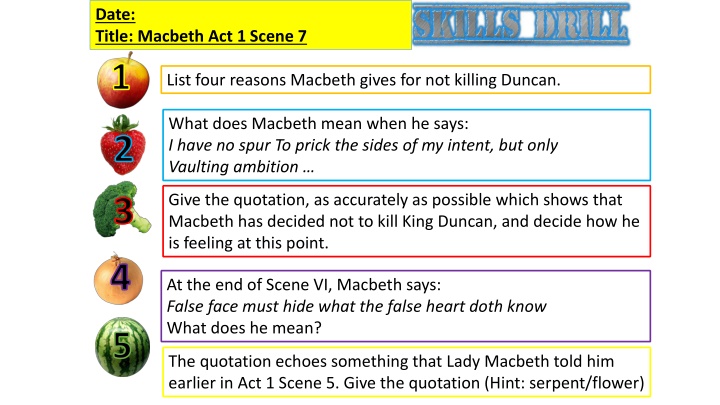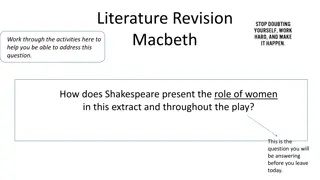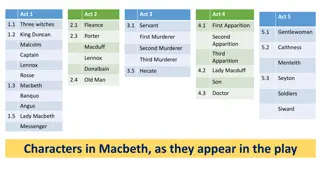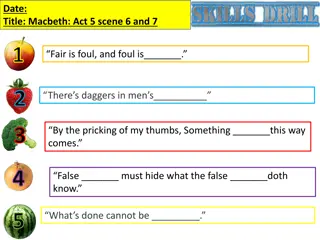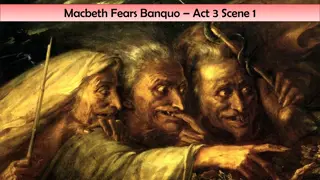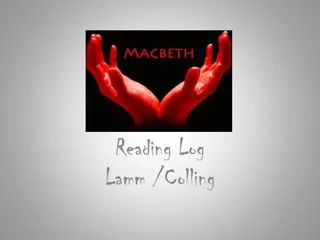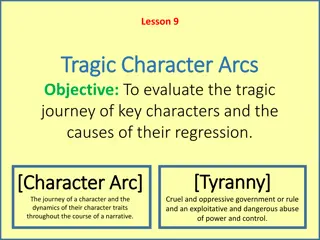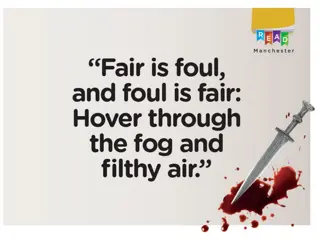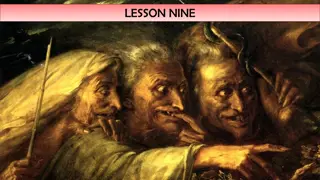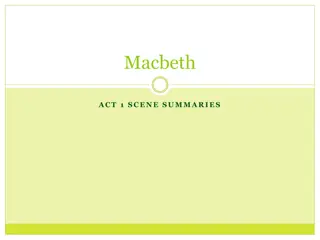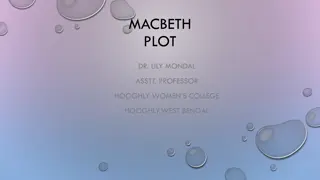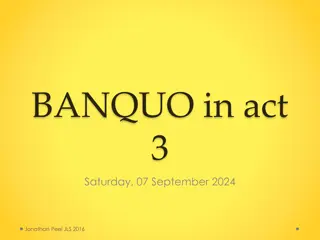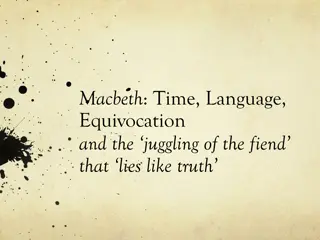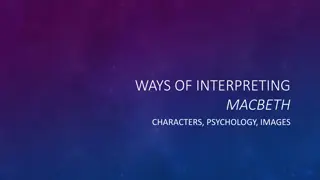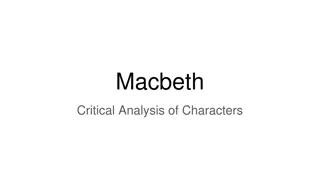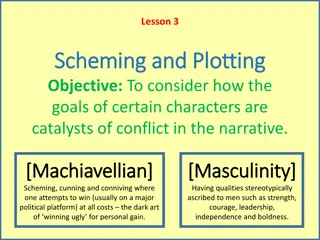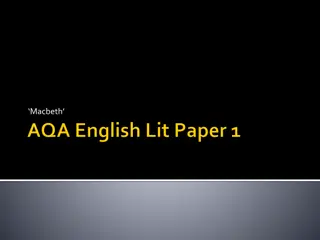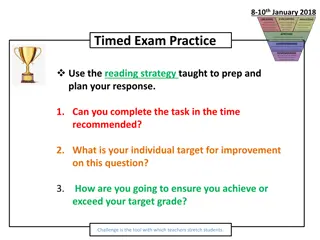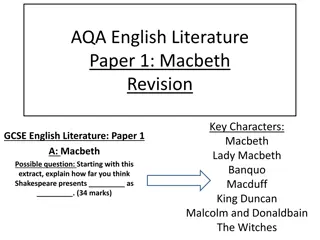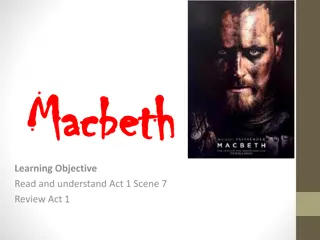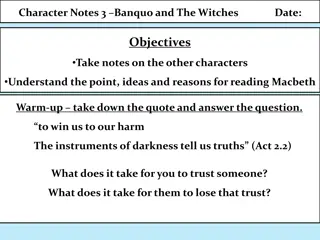Macbeth's Internal Struggle: To Kill or Not to Kill
In Act 1, Scene 7 of Shakespeare's "Macbeth," Macbeth grapples with the decision of whether to assassinate King Duncan. He considers the consequences, his loyalty to Duncan, the king's virtuous nature, and the only driving force being his ambition. Macbeth struggles with his vaulting ambition and ultimately decides against the regicide through his soliloquy. The scene reveals Macbeth's conflicting thoughts and emotions as he battles between his moral compass and his desire for power.
Download Presentation

Please find below an Image/Link to download the presentation.
The content on the website is provided AS IS for your information and personal use only. It may not be sold, licensed, or shared on other websites without obtaining consent from the author.If you encounter any issues during the download, it is possible that the publisher has removed the file from their server.
You are allowed to download the files provided on this website for personal or commercial use, subject to the condition that they are used lawfully. All files are the property of their respective owners.
The content on the website is provided AS IS for your information and personal use only. It may not be sold, licensed, or shared on other websites without obtaining consent from the author.
E N D
Presentation Transcript
Date: Title: Macbeth Act 1 Scene 7 1 List four reasons Macbeth gives for not killing Duncan. What does Macbeth mean when he says: I have no spur To prick the sides of my intent, but only Vaulting ambition 2 Give the quotation, as accurately as possible which shows that Macbeth has decided not to kill King Duncan, and decide how he is feeling at this point. 3 4 At the end of Scene VI, Macbeth says: False face must hide what the false heart doth know What does he mean? 5 The quotation echoes something that Lady Macbeth told him earlier in Act 1 Scene 5. Give the quotation (Hint: serpent/flower)
euphemism (noun) Euphemism is a way of avoiding saying something unpleasant by using other vague words. EXAMPLES: He has passed away. (He has died.) She is between jobs. (She is unemployed.) 1. Copy down the definition of the adjective euphemism. 2. Transform it into an image to help you remember it. 3. Debate it: Euphemismscan be useful and could even be described as good . However, they can also distort our understanding of what is real and encourage us to accept terrible things. 4. Use it: Write one sentence using the word euphemism.
Choose from the words below to show your impressions of each character in the scene. strong easily persuaded honest indecisive dominating tough practical clever with words calculating impulsive aggressive nervous supportive needing support sensitive unafraid acting
Act 1 Scene 7 At the beginning of the scene, Macbeth is alone on stage agonizing about whether to kill Duncan This type of speech which takes place when a character is alone (or thinks s/he is), is called a soliloquy. The first sentence of Macbeth s soliloquy is if it were done when tis done then twere well/it were done quickly . All this means is that if the murder has to be done, the sooner it is done, the better. You will notice from this sentence alone that Macbeth hardly ever refers directly to murdering Duncan instead he uses words or phrases which are less harsh these are called euphemisms
Macbeths arguments against killing the King: Macbeth fears the consequences of the murder in the after life and punishment in this world Duncan trusts Macbeth both as his kinsman (relation) and his subject As his host Macbeth should be protecting Duncan not wielding the knife himself Duncan has been a good and virtuous king and his killer would be damned for eternity Duncan s murder would provoke pity and horror Macbeth s only motivation to kill, is his ambition which is compared to a horse jumping over a hurdle and falling on the other side
When Lady Macbeth enters, Macbeth doesnt tell her about the struggle with his conscience he has just been having. In fact the only doubt he expresses to her in the remainder of the scene is that Duncan hath honoured [him] of late, and [he] has bought /Golden opinions from all sorts of people, / Which would be worn now in their newest gloss, / Not cast aside so soon. What do you think this means and why doesn t Macbeth tell her about the anxieties he has just expressed in his soliloquy?
Macbeths final words in this scene are False face must hide what the false heart doth know. Deceptive appearances are a recurrent theme in the play. Look back over Act 1 and make a list of as many examples as you can find where the reality of a situation is hidden by outward appearances.
Lady Macbeths persuasiveness Lady Macbeth is skillful in persuading Macbeth to murder the king and make the weird sisters prophecy come true What does her success at persuading Macbeth suggests about her character and relationship with her husband?
Find quotes to show how Lady Macbeth uses the tactics in the chart to persuade Macbeth to go through with the murder. Comment on how effective each quote is. Does she use any other ways of persuading Macbeth? Tactic Example Flattery Accusing Macbeth of cowardice And live like a coward in thine own esteem, Letting I dare not wait upon I would , Like the poor cat I the adage? Lady Macbeth is referring to a proverb in which a cat wanted to catch fish but didn t want to get its feet wet. It is effective because she is suggesting that Macbeth wont be able to have self respect if he doesn t commit the murder Questioning Macbeth s manhood Reassurance Emphasing her own determination
What knowledge have you learnt today? What skills have you learnt/developed today? How has your previous learning helped you in today s lesson?
